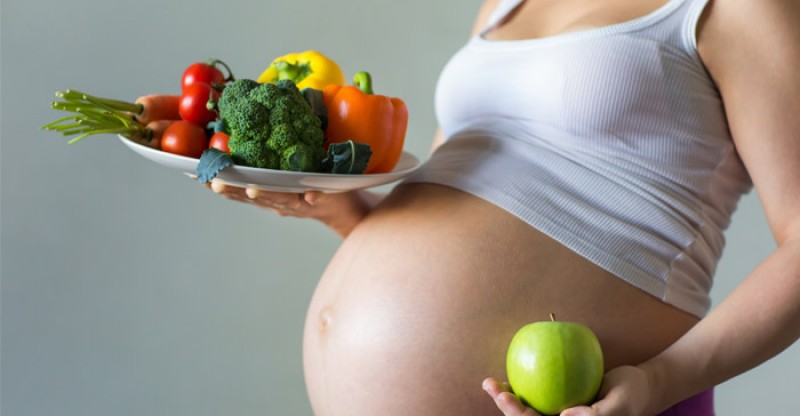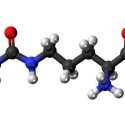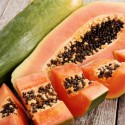20 Best Foods to Eat While Pregnant
Eating for two comes with a lot of responsibility.
Intake of lean protein, vitamins, minerals, and fiber are essential for supporting the baby’s growth.
During the 2nd and 3rd trimesters, pregnant mothers need anywhere from 350 to 500 additional calories every day.
As a pregnant woman, you’re probably all too aware of the foods you shouldn’t be eating.
Some types of foods can increase the risk of E. coli and salmonella (such as undercooked eggs, sprouts, cookie dough, or under-pasteurized juice) (1).
Having a healthy diet during pregnancy is integral to the growth and development of your baby.
Eating healthy is great for your mind and body, and it’s also essential for your baby’s growth.
Here are 20 of the best foods to eat while pregnant:
Sweet Potatoes
This vegetable gets its orange color from plant pigments called carotenoids.
This same pigment is found in other orange vegetables, all of which are high in vitamin A (2).
Vitamin A is essential for the embryonic growth of your baby.
This vitamin helps your baby develop a healthy heart, central nervous system, lungs, eyes, bones, and kidneys.
It’s also beneficial for women who are ready to give birth — since it helps aid in postpartum tissue repair, fights infections, and supports your immune system.
Sweet potatoes contain Vitamin B6, which can help ease common side effects of pregnancy (including nausea and vomiting) (3).
They also contain antioxidants, which help keep free radicals out of your body.
The anti-inflammatory properties found in purple sweet potatoes can help with swelling and discomfort during pregnancy (4).
Get the most nutrients out of your sweet potatoes by baking them in the oven (instead of frying or boiling) (5).
Eggs
In addition to containing protein, eggs contain more than 12 vitamins and minerals.
One of these vitamins is choline, which promotes a baby’s brain health and prevents neural-tube defects (7).
Some eggs are bred to contain omega-3 fats.
These healthy fats contribute to your unborn child’s vision and brain development.
One large egg contains 6 grams of protein, which contains amino acids, aids in the healthy growth of an unborn child, and helps prevent preeclampsia and spina bifida.
Exercise caution when eating eggs while pregnant.
To prevent salmonella poisoning, ensure that eggs are thoroughly cooked (and the yolk is solid) before eating (8).
Avocados
Avocados can be eaten as snacks, spread on toast, or added to salads.
And they help balance cholesterol and control sugar levels.
This savory fruit is high in healthy folic acid (9) (which aids in the development of your baby’s organs and can help prevent neural defects) (10) and iron (which can help prevent anemia in pregnant women) (11).
Avocados are a great source of fiber and can help boost digestion, which is a welcome benefit to pregnant women.
Avocados are also rich in Vitamins B1, B2, B6, C, E, and K.
They’re all great for the development of a growing baby, and may even help prevent morning sickness (12), (13).
Salmon
Salmon is full of healthy omega-3 fatty acids and protein, which will help aid in the brain development of your baby (14).
The DHA and EPA found in salmon have been shown to lead to higher IQs in newborns, as well as advanced motor skills and fewer neurological issues (15), (16).
Salmon is also low in mercury and is generally considered a safe fish for expecting mothers (as long as you don’t exceed two servings weekly) (17).
In addition, salmon contains vitamins and minerals (such as vitamin B12, niacin, zinc, phosphorus, potassium, and healthy proteins).
Maintaining healthy vitamin B12 levels is important, even post-pregnancy.
Studies show that breastfeeding mothers deficient in vitamin B12 can pass on developmental issues to their infants (such as anemia and growth failure) (18).
Water
The importance of hydration only increases during pregnancy.
The Institute of Medicine recommends that pregnant and breastfeeding women consume 13 glasses of water every day (19).
Water is essential for maintaining healthy organ functioning during the bodily changes associated with pregnancy.
It’s also directly responsible for transporting essential nutrients to your baby in utero and helps flush out the excess waste accumulated while eating for two.
Getting enough water can prevent urinary tract infections by flushing bacteria from your system.
Staying hydrated also relieves fatigue (20), and research shows that an intake of water can actually improve mood and cognitive function (21).
Drinking the Recommended Daily Intake (RDI) of water can help prevent exhaustion and fatigue, which are common symptoms of pregnancy.
In addition, it helps rid the body of excess sodium and helps reduce swelling.
Edamame
Edamame is packed with nutrients including protein, folate, vitamins A and B, and calcium that are healthy for mothers and their growing babies.
Edamame is full of antioxidants, which help strengthen the immune system during pregnancy and fight against harmful microorganisms (22).
The calcium in edamame isn’t the only thing that’ll strengthen your bones.
It also contains iron, vitamin E, and phosphorus, which all contribute to bone health and growth.
Also, one research study showed that eating edamame may reduce the risk of bone fractures (23).
Use edamame in salads, soups, or stir-fries.
It also makes a great substitute for beans, especially for expectant mothers who are dealing with stomach issues.
Edamame is a soy product and contains anticancer properties that’ll keep you in your best health.
Lean Meat
Protein is essential for a healthy pregnancy.
Pregnant women should consume at least 75 grams of protein every day (25).
Lean meats are a great source of healthy protein, B vitamins, and iron.
The amino acids found in protein help create the cells that make up your baby, and the iron found in lean meats aids in the development of your baby’s red blood cells (27).
The healthy fats provided by certain meats supply the needed calories during pregnancy.
They enable the body to metabolize essential vitamins (such as A, D, E, and K) (26).
High-protein foods are an excellent choice during pregnancy since they provide essential proteins for both mother and child.
High proteins also stabilize hunger and blood sugar levels.
Look for protein in lean meats (such as chicken and fish), and stay away from fatty connective tissues and red meat.
Beans
Beans are a great source of copper, iron, zinc, and phosphorus.
Iron is key in the formation of blood cells, and it’s also responsible for making hemoglobin (which then carry oxygen from the lungs of the mother to those of the baby’s) (28), (29).
Zinc is helpful in cell division, DNA construction, and tissue growth in fetuses.
Phosphorus works with calcium to make sure your baby’s teeth and bones are growing healthy and strong (31).
It’s also responsible for utilizing nutrients, improving hormonal balances, and aiding in protein formations (32).
Fiber is an integral part of any diet, especially during pregnancy.
Pregnant women are expected to consume up to 30 grams of fiber each day, so beans are helpful in that capacity (33).
Beans are a cost-effect source of protein and serve as a great meat alternative for vegans and vegetarians during pregnancy.
Mangos
Mangos are a sweet snack, which helps support the growth of your baby during pregnancy.
You can also put mangos in smoothies, salads, or soups.
In addition, these fruits are rich in vitamins A and C.
Vitamin A is essential for the growth of your baby and aids in the development of their skin cells, lungs, eyes, and immune system (34).
Mangos also contain magnesium (which is said to combat the leg cramping that’s commonly felt during pregnancy) (35) and enzymes (which help break down protein and improve digestion).
And the fiber, vitamin C, and pectin found in mangos can help lower LDL cholesterol (36).
Whole Grains
After conception, the daily RDI of fiber increases from 25 to 28 grams.
The Canadian Community Health Survey revealed that the average woman only gets half of this amount.
Therefore, incorporating whole grains and fiber into pregnancy diets will become more important (37).
Whole grains are rich in fiber and can help combat the cramps and constipation commonly experienced during pregnancy.
They’re full of healthy vitamins and minerals (such as iron, magnesium, vitamins B1 and B2, niacin, folic acid, and iron) (38).
The carbohydrates found in whole-grain foods will serve as the main energy sources during pregnancy.
These carbs are broken down into sugar, then passed across the placenta to provide energy to your growing baby (39).
The vitamins found in whole grains are essential for the growth of your baby’s placenta and its development in the womb.
Look for whole grains in rice, bread, and cereals, and find ways to incorporate them into your pregnancy diet.
Berries
Berries are chockful of the vitamins and minerals needed for growing babies and their mothers.
The Mayo Clinic guidelines show that a woman needs roughly 4.5 cups of fruits and vegetables each day during her first trimester (40).
There’s 114 mg of potassium per one cup of blueberries.
Berries contain ellagic acid, which has been found to have anticancer properties.
The vitamin C found in blueberries can boost your immune system during pregnancy (41).
Vitamin C will also even out your blood pressure (42).
However, an overdose of vitamin C can cause negative side effects.
While this condition is rare, you should check with your doctor before deciding about a proper vitamin C intake during pregnancy.
You can also avoid pesticides by choosing clean organic berries.
Carrots
Carrots are rich in Vitamin A, which supports sight and movement in the growing fetus.
The vitamin C found in carrots helps protect your immune system, which can be weakened during pregnancy (42).
Vitamin C also helps your body absorb iron.
Carrots contain iron, which helps form red blood cells and prevents anemia in pregnant women (43).
Fiber, calcium, beta-carotene, and potassium are also found in carrots.
The antioxidants found in carrots help flush out harmful free radicals.
Antioxidants are also shown to fight disease, lower LDL cholesterol, protect DNA, and contribute to healthy eyesight (44), (45).
In addition, carrots help cleanse the liver (46).
Don’t consume more than the RDI of carrots.
Carotene may interfere with the growth of your baby.
Dried Fruit
Women who are pregnant need to consume more calories in a healthy way.
Dried fruit is a great way to get more calories in a snack rich in iron, fiber, and vitamins.
Organic fruits contain most of the same nutrients as fresh fruits — without all of the excess water.
In other words, dried fruit is a great source of vitamins and minerals.
Folate, potassium, and iron are just some of the healthy ingredients.
Dates are a great choice since they’re high in plant compounds, potassium, iron, and fiber.
Studies show that the regular consumption of dried dates in the 3rd trimester may help with cervical dilation and lower risks of induced labor (47), (48).
Avoid dried fruit of the candied variety, as they contain large amounts of sugar.
Stick to organic, all-natural selections.
Figs
Figs make for a healthy snack during pregnancy.
This fruit contains magnesium, potassium, phosphorus, and other vitamins and minerals.
They’ll help develop your growing baby’s gums and teeth.
Dried figs contain 5 grams of fiber per cup and more potassium than bananas (which can help regulate blood sugar) (49).
Women need 27 mg of iron every day during pregnancy, and 9 mg during breastfeeding (50).
Figs are full of iron, which is also required to help your placenta grow, particularly in the 2nd and 3rd trimesters (51).
In addition, they contain zinc, which is used in the formulation of your baby’s DNA, tissue growth, and cell production during pregnancy.
Dairy Products
Dairy products are a great source of the calcium and protein needed during all stages of pregnancy.
Greek yogurt is a nutritious addition to any diet, especially during pregnancy (52).
Greek yogurt contains calcium and vitamins A and C, and it contributes to the growth of your baby’s nails, bones, and teeth.
During pregnancy, women need calcium to help strengthen their bones.
Calcium also aids in the formation and growth of your baby’s skeletal system.
Dairy products also contain vitamins B12 and B2.
Also known as Riboflavin, this vitamin promotes healthy skin, vision development, and fetal growth in your baby (53).
Greek yogurt contains anywhere from 12-20 grams of protein per 7 ounces.
Thick Greek yogurt may also ease bloating, indigestion, and gastritis, which are common symptoms in the 3rd trimester (54).
Weight control is another great benefit of adding Greek yogurt to your diet.
It contains less sugar than regular yogurt and curbs hunger (55).
And it contains iodine, which promotes brain development in fetuses (56).
Make healthier choices during pregnancy.
While dairy is great for essential vitamins and minerals, it can also mean unnecessary fats coming into your body.
Don’t be afraid to opt for calcium-fortified options (such as soya milk and cheeses) or skim milk.
Pregnant women shouldn’t consume unpasteurized milk or soft cheeses, as they contain the listeria bacteria associated with miscarriage and illness in newborns.
Bananas
Everyone’s favorite yellow fruit is jam-packed with health benefits.
Women suffering from morning sickness and diarrhea may benefit from eating a banana per day.
There’s 0.4 mg of vitamin B6 in each banana.
Studies show that taking this vitamin during early pregnancy can help improve symptoms of morning sickness (57).
Vitamin B6 also helps your baby start to metabolize carbohydrates and proteins, which aid in your child’s growing process.
Bananas are full of fiber, so they may also absorb excess water in the body, which contributes to diarrhea (58).
Bananas contain 358 mg of potassium per 100 grams.
Potassium helps ease the intestinal cramping experienced during pregnancy.
Fish Liver Oil
Fish liver oil is aptly named, as this supplement is made from the liver of fish.
This oil is rich in DHA and EPA, which are both forms of omega-3 fatty acids.
These acids are responsible for fetal eye and brain development in utero (59).
One study in the American Journal of Clinical Nutrition found that women who’d consumed fish oils during pregnancy produced infants with better sleeping patterns (60).
Fish liver oil also contains vitamin D, which can help protect pregnant mothers from preeclampsia (61).
Taking cod liver oil during early pregnancy can help babies have a higher birth weight, and may decrease their risk of disease later in life (62).
It also contains high levels of retinol, which can harm the fetus if taken too often.
Women considering taking fish liver oil during pregnancy shouldn’t exceed one tablespoon per day.
Walnuts
Nuts are a great way to get your minerals during pregnancy.
Peanuts, walnuts, and lentils are all excellent snacks that are packed with vitamins and minerals (such as magnesium, selenium, manganese, copper, Vitamin E, potassium, and calcium).
Selenium is wonderful for the healthy immune system, and it has strong antioxidant properties (which will protect your cells from damage) (63).
Women are supposed to ingest 800 milligrams of magnesium during pregnancy, making nuts an excellent choice for this bone-building mineral.
Magnesium can also help prevent premature labor, and aids in your baby’s nervous system development (64), (65).
Walnuts are also a great plant-based source of omega-3, which contributes to your baby’s growing brain.
In addition, legumes are rich in vitamin B9 (folates), which can help prevent infection, disease, and other problems during and after pregnancy (66).
Chives
Chives contain fiber, iron, and folate, which are all essential nutrients required for a healthy, growing baby.
Folic acid helps prevent your baby from any potential structural defects (67).
Magnesium is also found in chives, which can help relieve constipation.
Be sure to wash chives thoroughly before eating, which will remove any chemicals used in the growing process.
Leafy Vegetables
Green leafy vegetables (such as Brussels sprouts, broccoli, kale, spinach, and asparagus) are all folate-rich options for pregnant women.
Folate is a form of vitamin B (often referred to as folic acid).
Taking folic acid can help prevent birth defects in your baby’s spine and brain (68).
Since birth defects happen within the first 4 weeks of pregnancy, doctors often recommend that you start taking folate if you’re planning on getting pregnant (69).
Leafy green vegetables also contain iron, manganese, potassium, and fiber.
Since your blood volume expands during pregnancy, your body requires more potassium than normal.
This condition makes leafy greens a great choice in your pregnancy diet.
Conclusion
Pregnancy is the best time to take control of your diet.
Drink plenty of water, and incorporate foods full of vitamins, minerals, healthy fats, proteins, and carbs.
These practices will help you and your baby grow healthy and strong.
FDA Compliance
The information on this website has not been evaluated by the Food & Drug Administration or any other medical body. We do not aim to diagnose, treat, cure or prevent any illness or disease. Information is shared for educational purposes only. You must consult your doctor before acting on any content on this website, especially if you are pregnant, nursing, taking medication, or have a medical condition.
HOW WOULD YOU RATE THIS ARTICLE?







Is it harmful for my future baby if I stick to a vegan diet while pregnant?
Thank you for the article! I’ve had no idea walnuts are so essential!
Will I gain excess weight if I eat bananas? I know they are a high-calorie fruit.
Looks a like a great base for a balanced meal plan for every pregnant woman. Thanks!